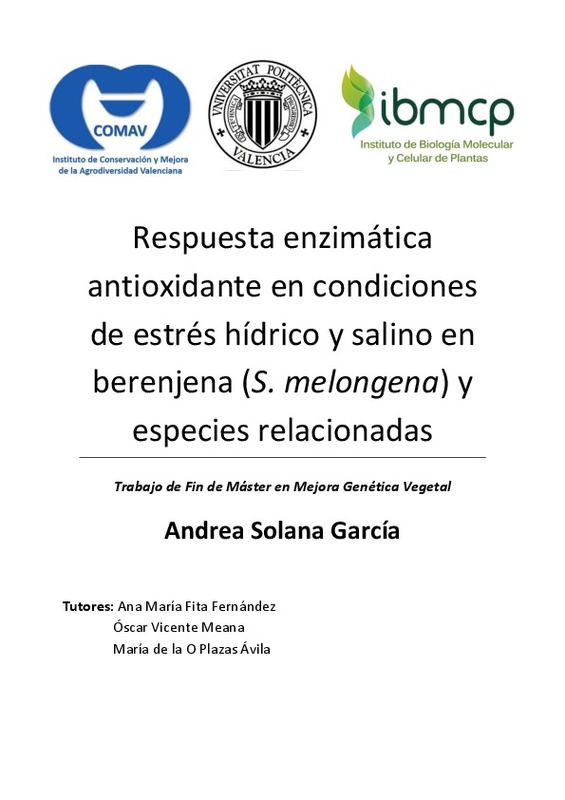JavaScript is disabled for your browser. Some features of this site may not work without it.
Buscar en RiuNet
Listar
Mi cuenta
Estadísticas
Ayuda RiuNet
Admin. UPV
Respuesta enzimática antioxidante en condiciones de estrés hídrico y salino en berenjena (S. melongena) y especies relacionadas
Mostrar el registro sencillo del ítem
Ficheros en el ítem
| dc.contributor.advisor | Fita Fernández, Ana María
|
es_ES |
| dc.contributor.advisor | Vicente Meana, Óscar
|
es_ES |
| dc.contributor.advisor | Plazas Ávila, María de la O
|
es_ES |
| dc.contributor.author | Solana García, Andrea
|
es_ES |
| dc.date.accessioned | 2019-11-06T13:57:34Z | |
| dc.date.available | 2019-11-06T13:57:34Z | |
| dc.date.created | 2019-09-30 | |
| dc.date.issued | 2019-11-06 | es_ES |
| dc.identifier.uri | http://hdl.handle.net/10251/130361 | |
| dc.description.abstract | [ES] El cultivo en zonas semiáridas y con sequía son dos retos agrícolas antiguos. Sin embargo, la gran explosión poblacional de las últimas décadas junto con las consecuencias derivadas del Cambio Climático hace que la búsqueda de soluciones sea más acuciante. La berenjena es un cultivo muy extendido en el mundo sobre el cual no se han realizado estudios sobre su posible adaptación a estas condiciones y sobre el potencial genético de sus especies relacionadas. Una de las respuestas al estrés salino e hídrico es la acción de enzimas antioxidantes. En este contexto, los objetivos del trabajo fueron: i) evaluar la tolerancia al estrés abiótico en berenjena (S. melongena), en uno de sus parientes silvestres (S. insanum) y sus híbridos, ii) analizar las respuestas antioxidantes enzimáticas a la salinidad y a la sequía de dichas accesiones. Para ello, tras someter a las plantas a los estreses mencionados se analizó el desarrollo de las plantas, sus niveles de H2O2 y la actividad específica de las enzimas: superóxido dismutasa, catalasa y glutatión reductasa. Las plantas evaluadas no se vieron afectadas gravemente en su desarrollo debido a los tratamientos de salinidad, mientras que la sequía sí afectó al desarrollo de las plantas. En ningún caso se observó una actividad enzimática antioxidante alterada frente al estrés. Al contrastar estos resultados con la bibliografía se puede concluir que los genotipos estudiados son capaces de mantener el balance osmótico a nivel celular sin necesidad de llegar a un estado de estrés oxidativo que induzca la actividad enzimática antioxidante. Para futuros estudios se recomienda aumentar el estrés para conseguir una respuesta más intensa y probar otros genotipos para comprobar si esta respuesta es generalizada en berenjena y sus especies relacionadas. | es_ES |
| dc.description.abstract | [EN] Crops in semi-arid and drought areas are two old agricultural challenges. However, the great population explosion of the last decades together with the consequences derived from Climate Change makes the search for solutions more pressing. The eggplant is a widespread crop in the world on which no studies have been carried out on its possible adaptation to these conditions and on the genetic potential of its related species. One of the responses to saline and hydric stress is the action of antioxidant enzymes. In this context, the objectives of the work were: i) to evaluate the tolerance to abiotic stress in eggplant (S. melongena), in one of its wild relatives (S. insanum) and its hybrids, ii) to analyze the enzymatic antioxidant responses to the salinity and drought of these accessions. To this end, after subjecting the plants to the aforementioned stresses, the development of the plants, their H2O2 levels and the specific activity of the enzymes: superoxide dismutase, catalase and glutathione reductase were analysed. The plants evaluated were not seriously affected in their development due to the salinity treatments, while the drought affected the development of the plants. In no case was an antioxidant enzymatic activity altered in the face of stress observed. When contrasting these results with the bibliography, it can be concluded that the genotypes studied are capable of maintaining the osmotic balance at the cellular level without the need to reach a state of oxidative stress that induces antioxidant enzymatic activity. For future studies it is recommended to increase stress to achieve a more intense response and to test other genotypes to see if this response is generalized in eggplant and its related species. | es_ES |
| dc.language | Español | es_ES |
| dc.publisher | Universitat Politècnica de València | es_ES |
| dc.rights | Reserva de todos los derechos | es_ES |
| dc.subject | Déficit hídrico | es_ES |
| dc.subject | Pool genético | es_ES |
| dc.subject | Respuesta fisiológica | es_ES |
| dc.subject | Cambio climático | es_ES |
| dc.subject | Mejora genética | es_ES |
| dc.subject.classification | BIOQUIMICA Y BIOLOGIA MOLECULAR | es_ES |
| dc.subject.classification | GENETICA | es_ES |
| dc.subject.other | Máster Universitario en Mejora Genética Vegetal-Màster Universitari en Millora Genètica Vegetal | es_ES |
| dc.title | Respuesta enzimática antioxidante en condiciones de estrés hídrico y salino en berenjena (S. melongena) y especies relacionadas | es_ES |
| dc.type | Tesis de máster | es_ES |
| dc.rights.accessRights | Abierto | es_ES |
| dc.contributor.affiliation | Universitat Politècnica de València. Departamento de Biotecnología - Departament de Biotecnologia | es_ES |
| dc.description.bibliographicCitation | Solana García, A. (2019). Respuesta enzimática antioxidante en condiciones de estrés hídrico y salino en berenjena (S. melongena) y especies relacionadas. http://hdl.handle.net/10251/130361 | es_ES |
| dc.description.accrualMethod | TFGM | es_ES |
| dc.relation.pasarela | TFGM\117657 | es_ES |






